Sacred Chickens
Menu
SACRED CHICKENS
 Fassbinder: His Movies, My Poems Drew Pisarra Review by Julie Carpenter Fassbinder: His Movies, My Poems, is a poetic reflection on the cinematic oeuvre of R.W. Fassbinder, by one of Sacred Chickens favorite poets, Drew Pisarra. It’s also one of my favorite categories of art: art that reflects on art, bending it, using it as a place to jump into something new. In this case, at the edges of the mirror Pisarra holds up to Fassbinder’s work, the world dissolves into the poet’s own creation. The reader need not know Fassbinder to enjoy this collection, but after reading these poems, you may find yourself searching out his films.
0 Comments
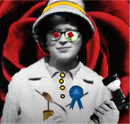 Video by Bill Ectric Based on "The Bite" by Julie Carpenter Check out this video teaser of "The Bite" from Things Get Weird in Whistlestop. The incomparable Bill Ectric imagines the neat, small world of Mary Edelson Brooks as it comes undone. Subscribe to his YouTube Channel and visit him at billectricking.com. Check out his collaboration with artist Nick Dunkenstein in Tamper Illustrated. 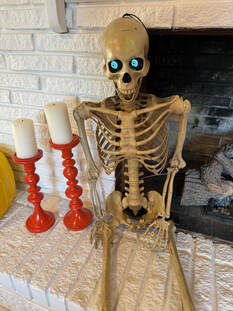 Morty's Miraculous Return A few years ago Uncle Morty suffered a series of unfortunate accidents that left him in pieces. Literally. Work was out of the question, of course. Complaining not so much. Who can blame him? Being reduced to a head and a pile of bones can't be a pleasant fate. Fortunately, it turned out that his metaphysical disorder left open the possibility that he could be re-embodied in a whole new set of bones. After some amount of searching and a few false starts, his new body was obtained. The next question was how to move the old grump from one to the other. We researched rituals and spells at length, but it turned out that all he needed was a five year old who loved him very much to turn on his eyes and Voila! Morty had a brand new body. 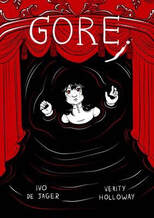 Gore, a Graphic Novel Written by Verity Holloway Art by Ivo de Jager Black Panel Press July 2023 Review by Roy Peak Beryl Gore, a lonely orphan in Victorian London, dreams of being more than just a stagehand at the Palace Theatre. Every night she walks through the dirty streets, past slaughterhouses and filth, to get to the Palace, where, enamored of the stories she watches unfold every night, she writes her own plays. She tries to get Mr. Perry, the theatre owner, to read them, but he always refuses. We see Beryl, and the theatre itself, age as the story progresses through the years, Beryl becoming older, the theatre losing it's luster and it's audience. When Beryl finds out the theatre is in trouble, will her newly written play be just the thing it needs? We see a lot of the story through Beryl's eyes, de Jager's art bringing Beryl's thoughts to the surface wonderfully through emotive facial expressions. Holloway's story is simple, yet powerful, utilizing a less is more approach works well to bring Beryl's story to life. I'm a big fan of black and white art and de Jager does a great job with clean line work and details such as fish in the river, the aging of Beryl gracefully through the story, and the playbills that go with the differing plays presented in the story. I really enjoyed the art as well as the story, they’re a great match for one another. Holloway's story is full of whimsy and sadness, a heartfelt, melancholic story of perseverance and hope. Click this link to see more and purchase: https://www.blackpanelpress.com/en/product/gore/  Bio: Roy Peak has played electric bass in more bands than he cares to remember for more years than he can remember. He wrote the theme song for the Utica, New York radio show "Hey You Kids, Get Off My Lawn" on WPNR-FM. His solo debut album, All Is Well, has been called "Loud, cacophonous, and beautiful by a truly unique artist." His short fiction has been published in The Dead Mule School of Southern Literature and he writes music reviews for the King Tut Vintage Album Museum of Jacksonville. Roy writes music reviews for the Rocking Magpie among others. Check him out on bandcamp.com 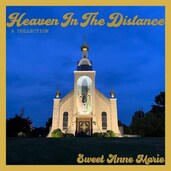 Heaven in the Distance Sweet Anne Marie New Music from Manic Pixie Indie Folk Songstress Sweet Anne Marie Self-Released September 1 2023 In between albums, some musicians like to release singles, and occasionally the "EP," which is usually short enough to fit on one side of a record, or just under twenty minutes. I like these little musical interludes, sort of a tease before the next big thing. Heaven in the Distance is an EP from Sweet Anne Marie, a self-described "Manic Pixie Indie Folk" artist, and a 2023 recipient of Best Solo/Acoustic Act by the Steamtown Music Awards in Scranton, Pennsylvania. Anne Marie has a sweet, breathy voice, and writes songs about the ups and downs of relationships, the uncertainness of possible futures, and life as a young woman in the 21st century. This EP features the new song "I'll Be Fine" along with demos, live tracks, and a reworked version of “Milk and Honey" from her previous album, Parking Lots, Bars, and Falling Stars. "I'll Be Fine" comes in both finished and demo versions, the demo with sprightly acoustic guitar, while the other version features bass and drums by Anne Marie's husband, Tyler Troutman, who also engineered and produced the album. "Milk and Honey" is more keyboard oriented here than in its earlier version on Parking Lots, Bars, and Falling Stars, with Anne Marie’s voice wrapped in lush reverb. "Somewhere in Time" and "Waiting" originally appeared on the album In Time, and here we get the demo tracks—well recorded, simple guitar and vocal, which is all these songs really need. We also get live versions of "Pine St." and "Signs,” the former of which appeared on Anne Marie’s album In Time. (I’m assuming these were recorded on a phone?) The vocals are a bit lost but you can definitely get a feel for the energy and passion in a live Sweet Anne Marie show. "Forget the Flowers" is a Wilco cover (available on Bandcamp only) and in my opinion Anne Marie’s version is more honest and less faux country bluegrass than the original. All in all, Heaven in the Distance is a fine EP, which I'm hoping this means that Sweet Anne Marie is leading up to another album of great songs. Check out Sweet Anne Marie live if you’re in Pennsylvania, and she'll also be at the Fest in Gainesville, Florida on October 27-29. A Selection of Sweet Anne Marie Links: https://sweetannemarie.bandcamp.com/album/heaven-in-the-distance https://spotify.link/U9cfUL6dtDb https://instagram.com/sweetannemariemusic?igshid=MzRlODBiNWFlZA==  Bio: Roy Peak has played electric bass in more bands than he cares to remember for more years than he can remember. He wrote the theme song for the Utica, New York radio show "Hey You Kids, Get Off My Lawn" on WPNR-FM. His solo debut album, All Is Well, has been called "Loud, cacophonous, and beautiful by a truly unique artist." His short fiction has been published in The Dead Mule School of Southern Literature and he writes music reviews for the King Tut Vintage Album Museum of Jacksonville. Roy writes music reviews for the Rocking Magpie among others. Check him out on bandcamp.com  Periodic Boyfriends By Drew Pisarra Review by Julie Carpenter It’s a rare writer who can combine laughter and tragedy, light and darkness, not only in the same poem, but in the same sentence. Drew Pisarra is that writer. The poems in this collection – a look back at all the boyfriends and lovers in his life through the metaphor of the periodic table – are a kaleidoscope of beauty, sadness, boredom, love, and all things human. Life seen through the lens of memory. The author transforms love and loss and even bleary eyed moments of regret into poetry. 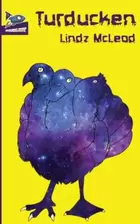 Turducken by Lindz McLeod Review by Julie Carpenter How shall I introduce this short story collection? As a literary high wire act – dangerous, exciting, with a touch of the bizarre? As a group of modern fables that feel both trippy and morally astute? As a compilation of character studies that make us emote with a turducken and feel the overwhelm of being stalked by the dead? As pure, unadulterated, experimental fun? It’s all these things and more. 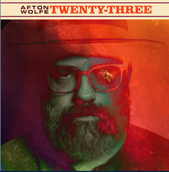 Album cover for Afton Wolfe, Twenty-Three. Album cover for Afton Wolfe, Twenty-Three. Twenty-Three Afton Wolfe Released February 3, 2023 Independent Review by Roy Peak This review is another crossover review with The Rocking Magpie. They have plenty more good stuff, so scoot on over there after you read this! More Music Magic From One of Americana's Most Prolific Artists To get the full meaning of the title of Afton Wolfe's latest release you have to go to the man himself: "The number 23 is Magic, and as such, it has been significant in my musical journey, so my delusional apophenia led me to release these 5 (2+3) songs together on 2.3.23 for the purpose of conjuring all the Magic I possibly could from this Music.” Is music magic? It most definitely can be and Wolfe conjures up five songs on this EP that fits the bill.  Cover Art from Floating Candle A girl with glasses reaching forward from a dark background Cover Art from Floating Candle A girl with glasses reaching forward from a dark background Floating Candle Author: Sparrow Starfell Sardothian Review by Julie Carpenter Memoir is one of the most difficult forms of literature, if not the most difficult. Even if you have a tale to tell – and this author has an amazing one – it’s tough to move outside yourself to see your life as a story. But fortunately for the reader, Sparrow has a natural instinct for storytelling and an incredible life. These two threads come together to create Floating Candle – a memoir that’s gripping and painful, but also uplifting. 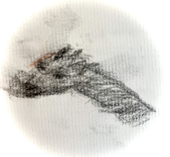 SCRUFFY LOOKING GIRAFFE IN CHARCOAL SCRUFFY LOOKING GIRAFFE IN CHARCOAL From the Sacred Script: Writing from Chaos by Julie Carpenter I’m taking a figure drawing class with my husband for fun. He’s quite good and I am – it’s safe to say – the worst sketch artist in the class. But it’s freeing. My expectations are low enough to allow me to meet or even exceed them with very little effort. Anyway, I think it’s good to try new ways of thinking and seeing as you get older, regardless of the results. In an effort to retrain my brain to see things in patterns of light and line, I’ve been watching videos about sketching. Below is one of the videos I found most fascinating. |

Click Photo above to buy ebook or paperback from Amazon.
Here's the link to Barnes and Noble Or order through your favorite independent bookstore! Categories
All
|
 RSS Feed
RSS Feed